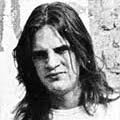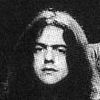|
Blackmore insisted on nothing but candlelight in his private dressing room.  Mark Evans: Maybe he was on some medieval kick, who knows, but the candles had to be lit ready for his arrival. Cod, our stage roadie, could always get a Blackmore tizz going by sneaking in and blowing the candles out.
Mark Evans: Maybe he was on some medieval kick, who knows, but the candles had to be lit ready for his arrival. Cod, our stage roadie, could always get a Blackmore tizz going by sneaking in and blowing the candles out."I want to know who is blowing my candles out NOW and bring them here NOW!" announced the star of the show. We didn't say a word. There was a notice posted in the backstage area warning that anyone caught blowing out Ritchie's candles "will be dismissed immediately." Oh, fuck off! Dirty Deeds: My Life Inside/Outside AC/DC by Mark Evans - published in 2011 You apparently know that the Dutch political party CDA used the song “Love Is All” in its election advertisements in 2006. What is your opinion about this move? Did you approve it?  Roger Glover: I didn’t know it. And I’m not very happy about that. I’ve always tried to be not political in my career, a person’s politics are his private things, and I don’t wanna influence the people to think the way I think. I’m a-political, if you like. So to have something of my musical work used for a political purpose actually doesn’t please me very much.
Roger Glover: I didn’t know it. And I’m not very happy about that. I’ve always tried to be not political in my career, a person’s politics are his private things, and I don’t wanna influence the people to think the way I think. I’m a-political, if you like. So to have something of my musical work used for a political purpose actually doesn’t please me very much. Headbanger RU - September 9, 2011 [Full interview here] Just for old times' sake Glover mans up to a Ritchie Blackmore question. Turns out he hasn't spoken to the original Purple guitarist for years.  Roger Glover: There was a argument over a quad mix of one of his solos on "Smoke on the Water" [on the 2002 box set "Listen, Learn, Read"], and I've been told he will never speak to me again. I didn't respect his guitar work, apparently. I don't really care. I wouldn't mind speaking but he's withdrawn into his own madness. No comment. Happy he's happy.
Roger Glover: There was a argument over a quad mix of one of his solos on "Smoke on the Water" [on the 2002 box set "Listen, Learn, Read"], and I've been told he will never speak to me again. I didn't respect his guitar work, apparently. I don't really care. I wouldn't mind speaking but he's withdrawn into his own madness. No comment. Happy he's happy.Classic Rock Magazine - September 2011 Even though you play Music Man guitars and, of course, have your own signature line of Steve Morse models, did you ever consider a Strat to get a truly "Blackmore-ian" tone?  Steve Morse: No, not really. I've seen this time and time again, and I'm sure you have, too: You get two guitar players, give them the same guitar, same amp, same setup, you can even give 'em the same pick [laughs]…and they'll sound totally different. Equipment has very little to do with it; it's all about the player and his feel and approach to music. It's just like acting: two actors can read the same words from the same script, and you'll get two completely different performances.
Steve Morse: No, not really. I've seen this time and time again, and I'm sure you have, too: You get two guitar players, give them the same guitar, same amp, same setup, you can even give 'em the same pick [laughs]…and they'll sound totally different. Equipment has very little to do with it; it's all about the player and his feel and approach to music. It's just like acting: two actors can read the same words from the same script, and you'll get two completely different performances.In truth, my attitude about my guitar was more based around what the band wanted, and what they said to me flat-out was, 'Don't copy Ritchie.' They told me that right off. They could've picked from plenty of people who wanted to be just like Ritchie Blackmore in Deep Purple. That's not what they wanted. They wanted somebody with his own persona – and not only that, but a strong persona. If I would play a Strat, everything would go right out the window and I'd be entering into that land of parody and emulating Ritchie Blackmore. I respect him totally, but I don't want to be him in a Deep Purple cover band. Music Radar - June 2011 [Full interview here] On Ronnie's split with Rainbow and subsequent decision to join Black Sabbath  Wendy Dio: He was fired by Ritchie Blackmore, because he didn't write more commercial songs. Ronnie had a very different way of writing. He didn't want to write love songs; he wanted to write about people's experiences, dreams, hopes, their hopes for the future. I thought they were great songs, and it's something that can never be repeated again. They were just incredible songs — 'Stargazer', 'Gates of Babylon', 'Catch the Rainbow' — all such great songs.
Wendy Dio: He was fired by Ritchie Blackmore, because he didn't write more commercial songs. Ronnie had a very different way of writing. He didn't want to write love songs; he wanted to write about people's experiences, dreams, hopes, their hopes for the future. I thought they were great songs, and it's something that can never be repeated again. They were just incredible songs — 'Stargazer', 'Gates of Babylon', 'Catch the Rainbow' — all such great songs.Martin Popoff, Goldmine Magazine - June 2011 Ronnie's fame and fortune and musical legacy took flight when Ritchie took over all of Elf except their guitarist and formed Ritchie Blackmore's Rainbow. It is also at this point that Ronnie meets Wendy Dio, wife and manager of Ronnie and his remarkable career until the end.  Wendy Dio: I met Ronnie in 1975, at The Rainbow. And we were introduced by Ritchie Blackmore, who I'd known for several years, I knew him and his wife. They invited me to a party they were having that night. Ritchie had just formed Rainbow, and that's how I was introduced to Ronnie. And Ritchie... Ronnie had the utmost respect for him as a musician. He learned a lot of things, what to do and what not to do, from Ritchie — I think they had a very good musical career together.
Wendy Dio: I met Ronnie in 1975, at The Rainbow. And we were introduced by Ritchie Blackmore, who I'd known for several years, I knew him and his wife. They invited me to a party they were having that night. Ritchie had just formed Rainbow, and that's how I was introduced to Ronnie. And Ritchie... Ronnie had the utmost respect for him as a musician. He learned a lot of things, what to do and what not to do, from Ritchie — I think they had a very good musical career together.Martin Popoff, Goldmine Magazine - June 2011 Do you keep in touch with any of your Deep Purple bandmates?  Glenn Hughes: I left the band so many years ago and I don't have any contact with anyone other than David. I haven't actually spoken to Blackmore or seen him since 1977. To be in a band for 3 years, 3 years, and to not have any sort of like Christmas cards or "hello," "fuck you," or anything, it's bizarre.
Glenn Hughes: I left the band so many years ago and I don't have any contact with anyone other than David. I haven't actually spoken to Blackmore or seen him since 1977. To be in a band for 3 years, 3 years, and to not have any sort of like Christmas cards or "hello," "fuck you," or anything, it's bizarre.Dan Bond (Obi-Dan), Geeks of Doom June 13, 2011 [Full interview here] Now, do you remember your first time meeting Ronnie James Dio? Obviously, it was back in the RAINBOW days.  Jimmy Bain: It was in the RAINBOW days, absolutely – it was in London & I had just spoken with Ritchie Blackmore a few days before, and he had asked me when I was gonna be playing again, and I said "next Sunday at the Marquee Club". And basically what he said was "I’m gonna come over and check you out" which freaked me out at the time, because he was my big idol as guitar players went. And as it happened, when he came over, he brought Ronnie Dio with him, and Bruce Payne, the manager, and Fergie, the roadie who was the guy who knew me, who introduced me to Ritchie in the first place.
Jimmy Bain: It was in the RAINBOW days, absolutely – it was in London & I had just spoken with Ritchie Blackmore a few days before, and he had asked me when I was gonna be playing again, and I said "next Sunday at the Marquee Club". And basically what he said was "I’m gonna come over and check you out" which freaked me out at the time, because he was my big idol as guitar players went. And as it happened, when he came over, he brought Ronnie Dio with him, and Bruce Payne, the manager, and Fergie, the roadie who was the guy who knew me, who introduced me to Ritchie in the first place.So they all flew over to London to see me play, and it was kind of hilarious, because my band really didn't do a very good job. The drummer did particularly bad, and was sick. And instead of hitting the drums, and the stick was coming up and hitting me… and I was singing and playing the guitar player’s roles… and I was just completely disgusted, because I thought that was my big chance to get into the states and play in a band with Blackmore and stuff. And as it happens, as Ritchie put it - they made me look great, so that’s kinda how I got the job. Rock Eyez - December 2010 [Full interview here] Now you say you got booted out – what happened there?  Jimmy Bain: Well, you know, Ritchie was kinda one of these guys- his idea of a sense of humor was terror for most people, because he’d play these kind of pranks on you, and he was a wind-up merchant. He’d come over and tell me my bass was out of tune on stage or something like that. A couple of times I knew the bass wasn’t out of tune, but I played his game a little bit with him.
Jimmy Bain: Well, you know, Ritchie was kinda one of these guys- his idea of a sense of humor was terror for most people, because he’d play these kind of pranks on you, and he was a wind-up merchant. He’d come over and tell me my bass was out of tune on stage or something like that. A couple of times I knew the bass wasn’t out of tune, but I played his game a little bit with him.This one particular night I felt really bad when he came over (to try it) and he was a little drunk at the time, so when he told me (I was out of tune) I said "Don’t say that! – one more time and you’ll be eating the bass!" kind of thing. So he kind of felt a little intimidated by that and I think that was one of the reasons I ended up getting my marching orders. Greg Schmitt, Rock-Eyed December 2010 [Full interview here] After your "Line Up" solo album Bonnet your next gig was with the Michael Schenker Group.  Graham Bonnet: It was a mess when I got there. Cozy had been telling Michael to get me in the band for some time. Gary Barden left or was fired, I was in pronto then we’re off to a store autograph signing at HMV in London. All these kids were asking me to sign Barden's MSG records and I was like, 'fuck this I didn't sing on these records.' As the afternoon went on I got worse and more belligerent 'till Cozy pulled the plug and we all went home. He started yelling at me the minute we got in the door saying, 'I got you this gig bastard, don't fuck it up.' Well in the end I did.
Graham Bonnet: It was a mess when I got there. Cozy had been telling Michael to get me in the band for some time. Gary Barden left or was fired, I was in pronto then we’re off to a store autograph signing at HMV in London. All these kids were asking me to sign Barden's MSG records and I was like, 'fuck this I didn't sing on these records.' As the afternoon went on I got worse and more belligerent 'till Cozy pulled the plug and we all went home. He started yelling at me the minute we got in the door saying, 'I got you this gig bastard, don't fuck it up.' Well in the end I did.The Cutting Edge 2007 [Full article here] |